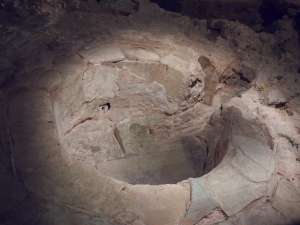Back in 2002 I gave a chapel talk on Exodus 4:24–26. It’s a difficult but not an impossible text. “At a lodging place on the way the Lord met him and sought to put him to death. Then Zipporah took a flint . . . Continue reading →
Sacraments
A Really Short Case For Infant Baptism (117 words)
There are about 60 million evangelicals in North America. Most of them assume or hold a Baptist interpretation of redemptive history, a Baptist hermeneutic (way of reading Scripture), and consequently, a Baptist view of the sacraments or signs and seals of the . . . Continue reading →
Sentiment Is Not A Sacrament
Holidays are a time for great sentiment, which the Oxford American Dictionary defines, in this usage, as an “exaggerated and self-indulgent feelings of tenderness, sadness, or nostalgia.” Who does not watch the annual Christmas movies? They are part of the late-modern communal . . . Continue reading →
Household Baptisms In Acts And Teen-Aged Children Of Adult Converts
Adam writes to ask about the baptism of fifteen-year old children of an adult convert. Should they be baptized before or after catechesis? § Hi Adam, This is a great question and a difficult one. I think it is correct to say . . . Continue reading →
Heidelberg 65: Faith, Union With Christ, And The Means Of Grace (3)
Neither Holy Baptism nor the Holy Supper create the realities they signify and seal but they are gospel sacraments. They are promises of good news to believers. Faith receives what they promise. Faith knows, assents, and trusts and receives all that they promise. The sacraments do not replace faith. They supplement faith. They confirm faith the way a registered letter embossed or stamped with a government seal confirms a declaration. Continue reading →
Heidelberg 66: Sacraments Are No More Or Less Than Gospel Signs And Seals (1)
66. What are the Sacraments? The Sacraments are visible holy signs and seals appointed of God for this end, that by the use thereof He may the more fully declare and seal to us the promise of the Gospel: namely, that of . . . Continue reading →
Heidelberg 66: Sacraments Are No More Or Less Than Gospel Signs And Seals (2)
66. What are the Sacraments? The Sacraments are visible holy signs and seals appointed of God for this end, that by the use thereof He may the more fully declare and seal to us the promise of the Gospel: namely, that of . . . Continue reading →
Heidelberg 66: Sacraments Are No More Or Less Than Gospel Signs And Seals (3)
66. What are the Sacraments? The Sacraments are visible holy signs and seals appointed of God for this end, that by the use thereof He may the more fully declare and seal to us the promise of the Gospel: namely, that of . . . Continue reading →
Calvin: A Sacrament Is An Outward Sign And Seal Of God’s Promises
First, we must consider what a sacrament is. It seems to me that a simple and proper definition would be to say that it is an outward sign by which the Lord seals on our consciences the promises of his good will . . . Continue reading →
Heidelberg 67: The Sacraments Are True Signs And Seals Of Christ And His Gospel (1)
67. Are both the Word and the Sacraments designed to direct our faith to the sacrifice of Christ on the cross as the only ground of our salvation? Yes truly, for the Holy Spirit teaches in the Gospel and assures us by . . . Continue reading →
Heidelberg 68: How Many Sacraments?
68. How many Sacraments has Christ instituted in the New Testament? Two: Holy Baptism and Holy Supper (Heidelberg Catechism) To Protestants, whether confessional or more broadly evangelical, it may seem obvious that there are only two sacraments but to the 60 . . . Continue reading →
Heidelberg 69: How Is Baptism A Sign And Seal?
69. How is it signified and sealed to you in Holy Baptism, that you have part in the one sacrifice of Christ on the cross? Thus: that Christ instituted this outward washing with water and joined therewith this promise: that I am . . . Continue reading →
Heidelberg 72–73: To Be Clear—Baptism Isn’t Magic But It Is Powerful
What is the frame of reference for baptism and washing? It is the flood. Did the flood save anyone? No. It condemned those who did not believe (an aspect of baptism sometimes neglected; there is a judicial aspect of baptism for the reprobate) but God’s people were saved out of the judgment by the ark. To what does the ark correspond? Christ. He is the ark. The Noahic baptismal flood was an antitype of Christ, who underwent the flood of judgment for us, and it testifies to our outward identity with Christ and to believers it signifies and seals that just as he suffered the judgment flood for us, as he was drowned in divine wrath, as it were, we have died with him and by his grace we have been redeemed. Continue reading →
Heidelberg 75: The Supper Is More Than A Memory (3)
75. How is it signified and sealed to you in the Holy Supper, that you do partake of the one sacrifice of Christ on the cross and all His benefits? Thus: that Christ has commanded me and all believers to eat of . . . Continue reading →
Heidelberg Catechism 76: Embracing, Communing With, And United To Christ
One of the great tragedies of the debates about the nature of the sacraments is that they force us to look at the sacraments instead of looking at him whom they signify, Christ, and that which they promise: the gospel. Thus far we’ve spent a good bit of time doing what it is necessary to come to a clear understanding of what sacraments are, how they are that (sacraments) and not the thing signified but true and real signs and seals of the covenant of grace. The Supper is a real, mysterious, Holy Spiritual communion in the true body and blood of Christ Continue reading →
The Cruelty Of Nominalism
Are Symbols Arbitrary? Recently there has been considerable controversy generated in a university classroom where the prof required students to create a sign with the word “Jesus” on it and then to step on the same. One student, a Mormon, refused and was . . . Continue reading →
The Sacraments Of The Covenant Of Works
A sacrament, is an outward sign, which God joins to his covenant, which he hath made with men. And that is either of an eternal, or temporal covenant. A sacrament of an eternal covenant, is a sacrament, whereby God confirms the promise . . . Continue reading →
Questions And Answers About Baptism
Earlier this week Calvinist Batman and I discussed covenant theology, baptism, and Reformed identity. That led to a follow-up discussion with some listeners. For the sake of brevity and clarity I have re-worded and abbreviated some of the questions and I have . . . Continue reading →
Strangers And Aliens (17b): As It Was In The Days Of Noah (1 Peter 3:18–22)
They were saved (διεσώθησαν) “through the waters” (δι᾿ ὕδατος). What Peter says is that it was in the midst of the circumstance of the flood or from the flood that Noah and his congregation were saved. Peter is not saying that the water was an instrument of their salvation. He has already said that the ark was the instrument or means of their salvation. If you have ever been whitewater rafting or found yourself in rough waters in a canoe, you understand. The rapid waters do not save anyone. No one was saved by the rising flood waters in Hurricane Katrina. They were saved in the midst of them by clinging to a rooftop or by a brave member of the Coast Guard (known affectionately as “Coasties”) dangling from a helicopter. Continue reading →
With The Reformed Pubcast On The Means Of Grace
What do sacraments do? Do they anything or are they just rituals we perform? These are some of the questions Les, Tanner, and I discussed on this episode of the Pubcast. The most fundamental question is whether God ordinarily uses means? In . . . Continue reading →












